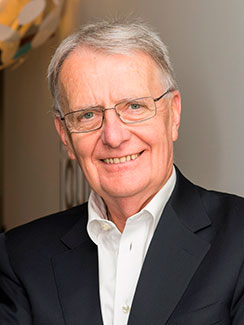Investing in interdisciplinary global research collaborations: Q and A with Warwick Anderson of HFSP
May / June 2019 | Volume 18, Number 3

Warwick Anderson, Ph.D.
Professor Warwick Anderson is Secretary-General of the Human Frontier Science Program (HFSP), located in Strasbourg, France. Previously, he was the inaugural CEO of Australia’s National Health and Medical Research Council, serving from 2006 to 2015. He earned a Ph.D. from the University of Adelaide and then held research positions at the University of Sydney and Harvard Medical School. He was later head of the School of Biomedical Sciences and a physiology professor at Monash University. Anderson was made a Member of the Order of Australia in 2005.
How did HFSP come into being?
I think it’s powerful that this research organization was started at the end of the Cold War by influential politicians in the G-7 such as Prime Ministers Nakasone and Thatcher, and President Reagan. It’s significant that the leaders of the seven biggest nations said it’s time to emphasize the world needs to work as one, that we need to bring scientists together to build a universal approach to something that is important, which is to advance understanding of ourselves through life sciences research and to together make discoveries that will benefit humankind.
How is it different from other funders?
HFSP is the only research funder where multiple countries put money in a pool to support research projects and fellowships that are awarded centrally. We solicit curiosity-driven proposals that have the potential to transform an aspect of life science. We’re also unique in that we don’t demand preliminary results, as a matter of fact, they’re grounds for disqualification. We require applicants to assemble a multidisciplinary team of scientists who’ve never worked together before and are proposing to tackle a subject that is new territory for them all. We believe that by deliberately setting up new interdisciplinary collaborations we can make the greatest impact over time. Increasingly, discoveries are being made at the interfaces between disciplines. By putting people from different disciplines together, we find it can light a spark and generate fresh, creative thinking. Also, each nation has its own scientific tradition and type of training. By bringing researchers from different backgrounds together, it can often mean that one plus one equals three.
What funding opportunities do you offer?
Each year, HFSP awards about 30 research grants and 100 postdoctoral fellowships. The research project grants offer up to $450,000 per year to support scientific teams that are international, preferably intercontinental, with the lead investigator located in an HFSP member country. The 3-year fellowships are awarded to postdoctoral scientists from any country, who are courageous enough to change direction and go to the world’s best lab devoted to that topic, to work on their idea with the field’s top scientists. Since its establishment, HFSP has issued more than 1,100 grants to about 7,000 scientists in nearly 70 countries.
What impact have you had?
I think HFSP funding has produced some completely stunning pieces of discovery. While we are very proud of the fact that 28 of our grantees have gone on to win the Nobel Prize, we’re most interested in supporting work that shifts the paradigm. We’re looking for original thoughts, risky proposals and are trying to push the world’s top scientists out of their comfort zones. Sometimes we have seen fellows take what they’ve learned and go home to start new departments at their institutions. Also, we’ve found that the partnerships formed during HFSP projects continue to grow long after the grant ends. In one case, a grant brought together a small team that has now sprouted to include some 500 scientists, who continue to collaborate virtually and even meet annually to share their findings. We’re really seeding areas of inquiry that grow into whole new lines of research.
What are your goals for HFSP’s future?
We’d like to continue to expand our membership beyond our current funding partners and are now reaching out to other countries with strong life sciences programs in Africa, the Middle East and Latin America. We’re in the process of setting up a foundation so that we can also accept charitable contributions. We intend to expand our research grants program and offer larger awards. In addition, we’d like to increase our outreach and convening of past HFSP award recipients, to facilitate new and ongoing collaborations. Finally, we think we can make a contribution by hosting consultations on ways to remove barriers to progress and explore emerging life science topics.
More Information
To view Adobe PDF files,
download current, free accessible plug-ins from Adobe's website.